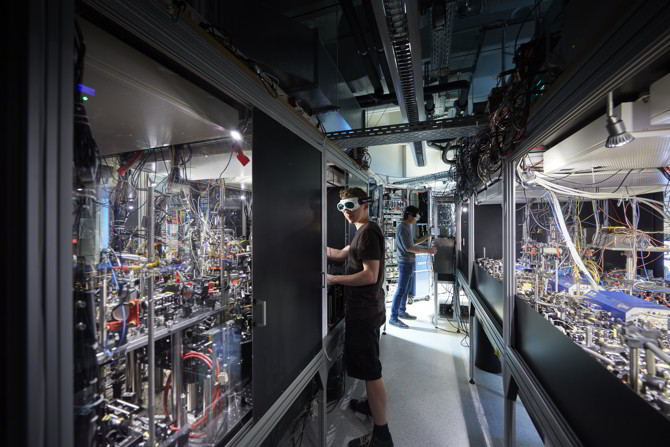Quantum Science & Technology

The study program QST goes significantly beyond the standard teaching program of quantum mechanics as in modern application of quantum technologies (Quantum2.0), the concepts of superposition and entanglement are of central importance. Owing to the complexity of the field, the study program QST aims at students which will work at the forefront of quantum science and who will expand the existing research areas in natural sciences (e.g. physics and chemistry), mathematics and engineering (e.g. computer science and electrical engineering).
Students learn to directly translate current results from research and development in science (e. g. Physics, Chemistry), Mathematics and Engineering (e. g. informatics, electrical engineering) into applications, such as quantum sensors, quantum algorithms, and quantum computers, which exploit quantum phenomena – especially superposition and entanglement.
The courses available within the QST Master’s program cover the basics and the skills required to successfully carry out research or industrial projects across interdisciplinary boundaries. In addition to the necessary background knowledge and practical know-how, the self and social skills required in the academic or industrial environment will be promoted. This profile is intended to enable graduates to be deployed in a wide range of research, industrial and service industries. Typical fields of application for the graduates of the QST Master’s program are in experimental and theoretical research activities, in the planning and documentation of research projects as well as in adjacent fields of activity of the computer science and technology industry, for example in patenting, development, project planning or in public institutions.
The QST Master’s program is designed for a two-year period in which students will experience research-related training at the interface between natural sciences, engineering and mathematics, and gain early insight into current research at the highest international level. The Master’s program combines the world-renowned study and research programs of two of Germany's leading Universities on an equal footing. Students can enroll in classes offered at both universities to design their individual curricula.
Specialization Areas
Students can specialize in the following areas:
- Experimental Quantum Science & Technology
- Theoretical Quantum Science & Technology
which reflect our research expertise.
Examples of Study Plans
The study program of the first year of studies can be organized individually. A mentor can give you advice in choosing the specific courses. If you are interested in a given research area, it may be helpful to choose a mentor working in it (e.g. see the lecturers of the courses). The second year with the research phase is structured identically for all focus areas and hence omitted in the tables below.
Focus on Experimental Quantum Science & Technology
Students with an interest in experimental Quantum Science & Technology may for example choose a study plan such as the following:
| Modules | Cycle | CP |
|---|---|---|
| Mandatory Modules | ||
| PH1009 QST Experiment: Quantum Hardware | WS | 10 |
| PH1010 QST Theory: Quantum Information | WS | 10 |
| Focus Modules | ||
| PH7003 Ultracold Quantum Gases | WS | 9 |
| PH2157 Applied Superconductivity | SS | 10 |
| PH7013 Quantum Optoelectronics | SS | 6 |
| PH2273 Semiconductor Quantum Electronics | SS | 5 |
| General-Education subjects and Lab Course | ||
| PH8116 Writing Scientific Papers: English Writing for Physics | SS | 4 |
| Advanced Practical Training | WS/SS | 6 |
Focus on Theoretical Quantum Science & Technology
Students with an interest in theoretical Quantum Science & Technology may for example choose a study plan such as the following:
| Modules | Cycle | CP |
|---|---|---|
| Mandatory Modules | ||
| PH1009 QST Experiment: Quantum Hardware | WS | 10 |
| PH1010 QST Theory: Quantum Information | WS | 10 |
| Focus Modules | ||
| PH2256 Quantum Many Body Physics | WS | 10 |
| PH2246 Topology and New Kinds of Order | SS | 10 |
| MA5054 Representation of Compact Groups | SS | 5 |
| EI7619 Simulation of Quantum Devices | SS | 5 |
| General-Education subjects and Lab Course | ||
| PH8116 Writing Scientific Papers: English Writing for Physics | SS | 4 |
| Advanced Practical Training | WS/SS | 6 |
Individual Focus
| Modules | Cycle | CP |
|---|---|---|
| Mandatory Modules | ||
| PH1009 QST Experiment: Quantum Hardware | WS | 10 |
| PH1010 QST Theory: Quantum Information | WS | 10 |
| Focus Modules | ||
| Catalog, Counseling by mentor | WS/SS | 30 |
| General-Education subjects and Lab Course | ||
| Catalog, Counseling by mentor | WS/SS | 4 |
| Advanced Practical Training | WS/SS | 6 |